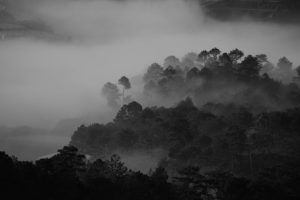The Ecofascist Potentials of Dark Green Religion?

As Bron Taylor points out on this blog, given the increasing social and political influence of dark green religion, one central aim of a recent conference in Mainz was to question its future prospects. This presented an opportunity for scholars to better explore what Taylor terms the “shadow side” of this expanding spirituality. In a time of rising ecological crisis, the question is whether there could be anything remotely dangerous about a spirituality that holds nature as sacred, and that thereby fosters feelings of deep connection to, and reverence for, the natural world.
In response to this task, I devoted attention to what I consider to be the “ecofascist” potentials of dark green religion. This certainly does not mean reducing dark green religion to fascism. There is nothing inherently fascistic in seeing nature as sacred or feeling deeply connected to the natural world. However, my intention was to sound a word of caution.
The growing presence in Europe today of an ecologization of fascist ideology cannot be ignored amidst the rise of dark green religion—the far-right also want to do ecology and nature spirituality. It should come as no surprise that the particularity of a very modern crisis like anthropogenic climate change, driven by, among other things, a globalized capitalist system of exchange, has encouraged a new face of fascism to emerge, one that outstrips the far-right’s tendency toward climate change denialism and obsessive attachment to fossil fuels.
The growing threat of fascism’s return across Europe should encourage us to critically probe where dark green religion is headed to given the parched ground that it currently occupies. The wider objective conditions certainly matter to the future prospects of dark green religion, but these conditions do not speak to a rise in the type of planetary consciousness in human beings that its proponents suggest it otherwise cultivates. After all, ours is a time of a globally emboldened far-right, a time of borders of barbed wire in Europe and beyond, and of renewed inter-imperialist rivalries. These mounting forces of reaction do not bode well for the formation of an “earth religion” that is planetary in scope. In these conditions, nature is taken as sacred, but its sacredness is splintered into particularisms.
My concern, in this context, is not so much the failure of dark green mobilizations than their adaption to such failure, in which dark green religion does not go quietly into the night but instead reconfigures its nature spirituality into something much more sinister. We should remind ourselves that fascism was, after all, a counter-revolution in the proper sense of that term. Fascism lived parasitically on an aborted revolution. It redirected the embers of utopian energy that lived on in the wake of failed emancipation.
But if we are to begin to understand today’s fascisms, we must not think that return equals simple repetition. Following Alberto Toscano’s excellent work on “late fascism,” we might want to avoid analogizing the ecologization of fascism back to fascism’s classical emergence—the raison d’être of much fascist studies. While pushing this approach to the extreme may endanger the very concept of “fascism” itself, it shouldn’t be too controversial to say that no matter how much one can trace a line of inheritance back to a classical iteration of ecological concern among, say, the Nazis, the objective factors in train today see to it that contemporary fascisms will inevitably articulate themselves in manners which lack neat resemblances to their past “faces.” Fresh eyes are needed for contemporary fascism to become legible. To that end, my work on ecofascism at this point can be summarized with two overarching comments:
Firstly, we ought to steer clear of framing ecofascism as a worship of the state. Questionable even in identifying its original historical object during the previous century, the framing of fascism as a highly centralized form of power leads us to misidentify ecofascism as state totalitarianism. But this simply doesn’t capture the ecofascist ideologies I set out to explore, which are ardently anti-statist and even anarchistic, and which subscribe to degrowth economies and radical localism in politics. Hervé Juvin, for instance, the ex-European Deputy of Marine Le Pen’s National Rally Party, went on to co-found the Localist movement to advocate for degrowth economies based on an essentialized notion of ethnic difference.
Indeed, much of this anti-statism within the ecofascist milieu is driven or at least accompanied by an embrace of what are seen as native Indo-European religions. This turn to paganisms is symbiotic with the European far-right’s current radical localism. In combination, we see emerge an ethnically understood idea of “carnal homelands” which are said to parallel bioregional lines of difference to which economic practices must adhere. In this new ecological fascism, then, the state is seen as just as much a peddler of the ideology of “sameness” as capital or human rights. It is therefore seen as a part of the problem.
Secondly, drawing attention to how a novel set of objective factors reshape fascism into something perhaps unexpected brings us to the issue of postcolonialism. Colonialism was always a crucial if not an often-neglected dynamic shaping interwar fascism. However, the reality of colonialism today is markedly different. This is expressed by the fact that just as quarters of the European far-right are undergoing a process of ecologization, so they are also undertaking a related process of “decolonizing” their worldviews. The influential figure of Alain de Benoist, a key ideologue of ecofascist ideology, stands out in this regard.
In de Benoist’s work we see a strange ideological hybridity which leans on postcolonial anthropologies of Indigenous forms of being and of knowledge, such as Robert Jaulin’s, to articulate an anti-universalism worldview. Not only does this ideological outlook carve up the world’s cultures into ontologically non-communicable paradigms, but asserts that each culture inseparably belongs to a natural bioregion which only it alone can harmonize in an ecologically sustainable manner. Needless to say that there is no promotion of an planetary oneness here. The framing is ripe for “othering”, anti-immigration and, potentially, violence.
At this point, one might respond that this clearly is worrying in itself but there is no evidence to suggest that dark green mobilizations will succumb to such ways of thinking and doing nature spirituality. Ecofascism is therefore real but nevertheless marginal to what is dark green religion’s tendency towards planetary consciousness. However, as I finish writing, the European parliamentary elections have just closed, with far-right parties making substantial gains. Given that these far-right parties are increasingly aligning with ecological issues on a patriotic front, an ideological battle for the heart of dark green religion is commencing, of which, I argue, ecofascist ideation will be a key player that ought not to be underestimated.
#
Nathaniel J. P. Barron teaches social theory at the University of Birmingham. His first book is entitled Language in Ernst Bloch’s Speculative Materialism (Brill, 2023).
Counterpoint blogs may be reprinted with the following acknowledgement: “This article was published by Counterpoint: Navigating Knowledge on 17 June 2024.”
The views and opinions expressed on this website, in its publications, and in comments made in response to the site and publications are those of the author(s) and do not necessarily reflect the views and opinions of Counterpoint: Navigating Knowledge, its founders, its staff, or any agent or institution affiliated with it, nor those of the institution(s) with which the author is affiliated. Counterpoint exists to promote vigorous debate within and across knowledge systems and therefore publishes a wide variety of views and opinions in the interests of open conversation and dialogue.
Photo Credit: © Dương Nhân, free download from Pexels.



